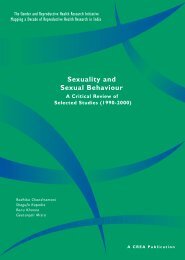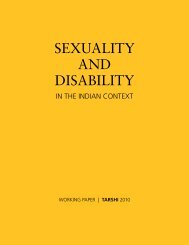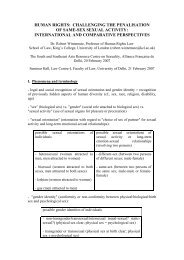People with Disabilities in India: From Commitment to Outcomes
People with Disabilities in India: From Commitment to Outcomes
People with Disabilities in India: From Commitment to Outcomes
You also want an ePaper? Increase the reach of your titles
YUMPU automatically turns print PDFs into web optimized ePapers that Google loves.
awareness rais<strong>in</strong>g about disability issues; and (iv) acknowledgement of significant issues <strong>in</strong><br />
collection of statistics on PWD (though the draft offers no strategy for how disability<br />
statistics can be improved).<br />
• the Policy often repeats general commitments of the PWD Act, though rema<strong>in</strong>s more<br />
general on concrete strategies for implement<strong>in</strong>g them. This major shortcom<strong>in</strong>g is not for<br />
want of <strong>in</strong>sight <strong>in</strong><strong>to</strong> the shortcom<strong>in</strong>gs of current policy and practice. For example, the POlicy<br />
sets out succ<strong>in</strong>ctly the reasons why the current disability certification process has not<br />
functioned well. However, <strong>in</strong> terms of the forward-look<strong>in</strong>g agenda, its merely urges state<br />
Governments <strong>to</strong> adopt “simple, transparent and client-friendly procedures”. There is no<br />
strategy for how the situation might be improved. This is one example, but such lack of<br />
concrete strategies is found <strong>in</strong> many parts of the document. This is not true <strong>in</strong> all areas (e.g.<br />
health strategies are outl<strong>in</strong>ed <strong>in</strong> somewhat more detail). However, overall there is very<br />
limited sense <strong>in</strong> the Policy that even GoI’s own assessments <strong>in</strong>dicate serious implementation<br />
problems. Simply reiterat<strong>in</strong>g the general commitments of the PWD Act is unlikely <strong>to</strong> be<br />
sufficient <strong>to</strong> re<strong>in</strong>vigorate the disability sec<strong>to</strong>r.<br />
• there rema<strong>in</strong>s limited reference <strong>to</strong> the role of PWD themselves <strong>in</strong> policy development,<br />
implementation and moni<strong>to</strong>r<strong>in</strong>g and evaluation. DPOs are not mentioned <strong>in</strong> the Policy, nor<br />
are PWD themselves. Rather, they rema<strong>in</strong> agents who <strong>in</strong>teract <strong>with</strong> the public policy and<br />
delivery systems either through public agencies or at best NGOs. While the Policy notes that<br />
“PWD are an important resource for the country, and seeks <strong>to</strong> create an environment that<br />
provides them <strong>with</strong> equal opportunities, protection of their rights and full participation <strong>in</strong><br />
society”, this critical <strong>in</strong>sight is not reflected <strong>in</strong> the ma<strong>in</strong> Policy.<br />
• there rema<strong>in</strong>s no strategy for <strong>in</strong>tegrat<strong>in</strong>g disability concerns <strong>in</strong><strong>to</strong> the work of PRIs. While<br />
the importance of PRIs is acknowledged, this rema<strong>in</strong>s an under-developed element of the<br />
Policy given the <strong>in</strong>creased importance of PRIs <strong>in</strong> many areas of service delivery.<br />
7.16 (ii) Education policy: An important po<strong>in</strong>t <strong>to</strong> note at the national level is that<br />
policy has progressed significantly <strong>in</strong> some areas s<strong>in</strong>ce the PWD Act. In particular, <strong>in</strong> the area of<br />
education, policy <strong>to</strong>wards <strong>in</strong>clusion of CWD <strong>in</strong><strong>to</strong> ma<strong>in</strong>stream education has become<br />
<strong>in</strong>creas<strong>in</strong>gly clear <strong>in</strong> recent years, and the policy statement of the MHRD <strong>in</strong> 2005 represents a<br />
more robust and concrete commitment <strong>to</strong> realiz<strong>in</strong>g the right <strong>to</strong> education of CWD. This is<br />
discussed <strong>in</strong> detail <strong>in</strong> Chapter 4.<br />
7.17 (iii) State policies on disability: An additional aspect of disability policy that has<br />
rema<strong>in</strong>ed relatively neglected is development of state-level disability policies. To date, the only<br />
states that have draft disability policies are Chhattisgarh and Karnataka, though Maharashtra<br />
has a state level Action Plan for implement<strong>in</strong>g its commitments <strong>to</strong> PWD. The draft Karnataka<br />
policy for the most part mirrors the structure and major provisions of the PWD Act. For the most<br />
part, it is a state-specific endorsement of various <strong>in</strong>itiatives for promotion of rights of PWD. In a<br />
number of cases, it repeats the PWD Act entitlements and commitments, and repeats general<br />
<strong>in</strong>structions <strong>to</strong> frame relevant schemes (e.g. reservation <strong>in</strong> poverty alleviation programmes;<br />
education). In others, the general commitments of the Act are put <strong>in</strong> a more state-specific context<br />
(e.g. health). In still others, there is more specific guidance on circumstances <strong>in</strong> which PWD<br />
should avail commitments under the Act (e.g. exemptions on property tax for PWD). For the<br />
most part, however, the draft state policy does not provide much more specific commitments or<br />
implementation guidance than the Act itself.<br />
7.18 In contrast, the Chhattisgarh draft state policy – the Comprehensive Disability Policy<br />
Framework for Chhattisgarh – can be considered “best practice” <strong>with</strong><strong>in</strong> <strong>India</strong>, and could<br />
provide a model for future national and state-level policy development. The Policy provides<br />
-130-










